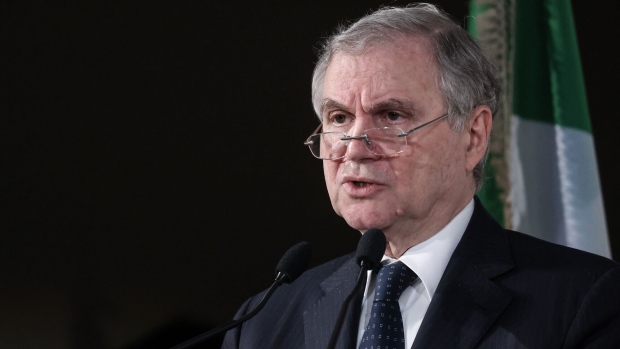May 30, 2023
Italy’s Crisis Guardian Counts Down to Exit as Meloni Mulls Successor
, Bloomberg News

(Bloomberg) -- Prime Minister Giorgia Meloni has just five months left to find a new Bank of Italy chief in what may be the one of the most significant appointments she gets to make.
Governor Ignazio Visco’s final annual speech on Wednesday — listing the challenges faced by the euro zone’s third-biggest economy — is also a reminder to the premier that the selection of his successor is coming up fast.
There’s currently no easy choice of candidate to replace the 73-year-old, an established guardian of Italy’s delicate financial harmony and an elder statesmen among European Central Bank officials. If the past is a guide, a summer of speculation and intrigue will grip Rome before the announcement.
The next governor will require the skills to set interest rates in Frankfurt, while counseling politicians and voters back home to manage the public finances prudently just as the European Union forges new fiscal rules and the threat lingers of a downgrade by Moody’s Investors Service.
“His successor will have to mediate between Italy and Europe, trying to convey his country’s needs and requests to Europe, while explaining to Italians what is expected of them from their European peers,” said Rossella Locatelli, a professor at the University of Insubria, near Milan.
Meloni’s fractious coalition must agree on a name before November in a complex process that will also need the thumbs up from President Sergio Mattarella. The front-runner in media reports is ECB Executive Board member Fabio Panetta. The 63-year-old former Bank of Italy official is considered a reliable choice who can provide a bridge between Rome and Frankfurt — and who would continue Italy’s dovish stance.
But replacing him at the ECB would mean subjecting any candidate to scrutiny by European Parliament lawmakers, some of whom eschew the Italian coalition’s rightwing bent. There’s also the fact that Panetta turned down a previous offer from Meloni to become Finance Minister, a slight that may not be forgotten.
Another person cited in speculation for the post is Lorenzo Bini Smaghi, chairman of Societe Generale SA and a former ECB Executive Board member who once lost out to Visco for the job.
If Meloni wants to select a different central bank insider, she has a plethora of qualified officials at her disposal — both at the Bank of Italy itself and at the ECB in Frankfurt.
The prime minister can contemplate her choice in the knowledge that the economy had a good start to the year: Growth for the first quarter was revised up on Wednesday, showing a 0.6% increase on the previous three months. Still, a separate report showed inflation didn’t slow as much as anticipated in May, weakening to just 8.1% and significantly overshooting the 7.5% predicted by economists.
Rethinking Italy
The appointment is the third stage in Meloni’s revamp of Italy’s economic elite that began with the installation of new Treasury officials earlier this year and continued with selections of state enterprise chiefs in recent months.
The governorship has a particularly hallowed status in Italy, whose central bank has long been seen as a haven of stability and expertise in a country vulnerable to political turmoil.
As a result, its top officials have frequently taken political roles. Of the eight Bank of Italy governors since World War II, two became head of state. Visco’s predecessor, Draghi, served as ECB president and premier.
In his comments on Wednesday, the governor warned the ECB to take care that its monetary policy doesn’t cause “an excessive brake on consumption and investment” and called on his Frankfurt colleagues to “proceed with the right degree of graduality.”
Visco’s speech also illustrated the stakes for a nation burdened with debt exceeding 140% of output and perennially weak growth.
From the sovereign debt crisis of the last decade, to a blowout of yields during the pandemic in 2020, to market jitters last year that forced the creation of a new ECB anti-crisis tool, Italy has never been far from financial turmoil.
All through those episodes, beginning with his surprise appointment in 2011 until the avoidance of a junk rating from Moody’s this month, Visco guided the country through the quagmire. He defied political criticism to win a second term in 2017.
A former Bank of Italy official and OECD chief economist, he took office as Draghi exited to lead the ECB. It was a tough act to follow for a mild-mannered intellectual with a penchant for Latin citations, whose management style favored more use of soft power and moral suasion than his predecessor’s.
“He’s been a very balanced governor,” said Locatelli. “He had to handle all manner of challenges, including helping banks out of the sovereign debt crisis and the transition from Bank of Italy to ECB supervision.”
--With assistance from Sonia Sirletti, Alessandro Speciale, Giovanni Salzano and Alberto Brambilla.
(Updates with inflation in 10th paragraph)
©2023 Bloomberg L.P.







